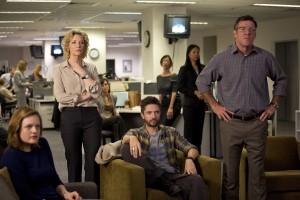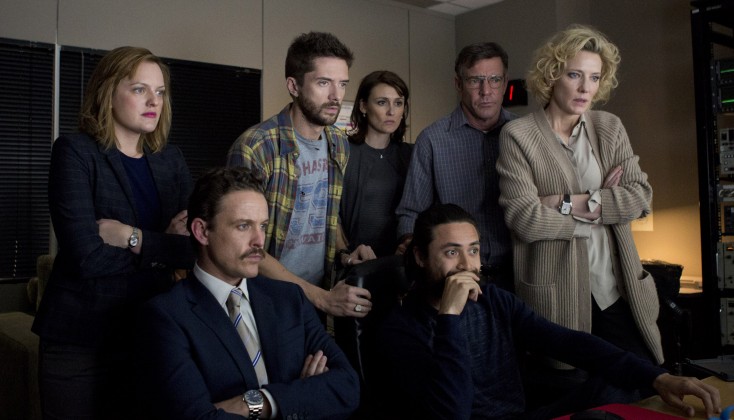
(l-r) Elisabeth Moss as Lucy Scott, Cate Blanchett as Mary Mapes, Topher Grace as Mike Smith and Dennis Quaid as Lt. Colonel Roger Charles in TRUTH. ©RadPac Truth LLC / Sony Pictures Classics. CR: Lisa Tomasetti
By ANGELA DAWSON
Front Row Features
HOLLYWOOD—Elisabeth Moss continues to show her versatility in the political drama “Truth,” in which she plays a professor/researcher who helps a “60 Minutes II” producer uncover some damaging information on then-Presidential candidate George W. Bush. However, due to various circumstances, including a tight deadline, the story airs before the “facts” can be completely vetted, causing a backlash against the producer, newsman Dan Rather and their research team.
Virtually unrecognizable as a platinum blond, Moss arrives for an interview looking stunning in a white and orange skirt and blouse ensemble. Asked about the new hair color, she indicates that it’s not for a role but “just for me.”
Best known for her role as glass ceiling-shattering copywriter Peggy Olson on the award-winning AMC TV series “Mad Men,” the actress has been busy building up a strong resume of roles in mostly independent films since the longrunning series concluded earlier this year. She starred with Mark Duplass in “The One I Love,” in “Listen Up Philip” opposite Jason Schwartzman, and the New Zealand-set miniseries “Top of the Lake.” The peripatetic actress has completed production on six films including “High-Rise,” directed by Ben Wheatley and starring Tom Hiddleston, “Meadowland,” directed by Reed Morano and starring Olivia Wilde, “Queen of Earth,” written and directed by Alex Ross Perry, “The Seagull,” directed by Michael Mayer and “The Free World,” a drama from director Jason Lew.
In “Truth,” she co-stars opposite Oscar winner Cate Blanchett, who plays Mary Mapes, an energetic and dogged investigative news producer, who comes across some damaging documents that appear to support a theory that Bush went AWOL, while supposedly serving in the Texas Army National Guard during the Vietnam War. An award-winning producer who had previously worked with Rather on other stories for the respected TV newsmagazine show, Mapes and her team, which included Lucy Scott (Moss’ character), a Dallas professor and seasoned researcher, and Mike Smith (played by Topher Grace), a Texas-based freelance journalist who had worked with Mapes previously, pursued the story during the Presidential campaign in which Bush was running against Democratic candidate John Kerry.
Mapes had received the documents from a former Texas Army National Guard officer who claimed he had documents that showed Bush was a no-show at the Guard during the war, but they turned out to be copies, not originals. Though that should have sounded an alarm bell with the veteran producer, she, Rather (played by Robert Redford) and her team forged ahead with the story, which aired on “60 Minutes II.” Almost immediately, the news team’s reporting came under fire, which eventually led to the departure of Rather as the longtime anchor of the CBS Evening News. James Vanderbilt wrote and directed the political drama based on Mapes’ “Truth and Duty: The Press, The President, and the Privilege of Power.”
Moss is no stranger to stories about political intrigue. She began her career playing the daughter of the President in the hit TV series “West Wing.” The divorced actress spoke about “Truth” and what she looks for in a role.
Q: How familiar were you with this story and these events before you got the script?
Moss: I suppose not very much at all. Obviously, I’m human and I watch “60 Minutes,” and know who Dan Rather is, and was sort of familiar of the periphery of the stories they were doing, but certainly not to the extent that I became while filming this project and after reading the book.
Q: Your character is based on a real professor. Did you get to speak with Lucy Scott and talk to her about what it was like at that time?
Moss: I sort of got everything I needed from the script and the book. I had heard she approved of my casting and she was good with being portrayed in it to an extent, but I think it was more of about who she was in the story and what her role was in the investigation, which was a very crucial role. From what I got she seemed like a very intelligent and reasonable person who’s capable of looking at both sides and Mary wouldn’t have picked her to be a part of the team if she didn’t have that value. For me, that was what was important, which was portraying someone who was bringing something to the table that was necessary to finding the truth in this story. That was the most important thing to me; now I just hope that she likes it and likes my hair!
Q: When you’re looking at a great story or narrative, what do you look for in the director you’re collaborating with as well? What kind of qualities do you look for?
Moss: It’s happened quite a bit, working with the director who has written the script, which happens a lot actually, I like that part of it because not only is there a knowledge of the story, but also a passion for the story. I think it’s so difficult to write, I don’t know how anyone does it, and it seems awful. So to me, the fact that they sat down and actually managed to write a script is incredible. They must have loved it and really wanted to tell this story, so when you get that kind of passion and drive in the director, I find it really helpful. It helps to not have to go ask the writer what he meant when he said that, to not have to go, “Do you mind if we change this line?” or, “Can we do this instead of that?” They’re right there and they know the material better than you ever could, so for me that was something that was really valuable and I really do like when that happens. Cate (Blanchett) said it last night, that there’s no right or wrong way to direct, and actors are so different. Even if there is a “right” way to direct, actors are going to want different things. So there isn’t any one way to do it because everyone’s different and requires something different.
Q: Is it always a good feeling when people come up to you and compliment you on your body of work?
Moss: No, it never gets old. I want the audience to be entertained and to enjoy it and to have an experience and I do it because I love it, but I’m also not doing it in a closet somewhere where nobody can see it. So if people are moved or affected by a character or a story, it’s everything to me. That’s why I try to take time to stop and talk to fans and take pictures because this is reason why I got my job, this is why I can pay my rent, so for me, yea that’s everything. I’m always incredibly complimented. I thrive on flattery.
Q: What led you to the projects you’ve taken on?
Moss: It’s so much about the script for me, every time. I love that we live in a time now where it doesn’t matter if it’s film or TV or theater. For me it doesn’t matter if it’s a big film or a small film, or a half hour or an hour, or West End or Broadway. For me it’s just about the script itself. I don’t necessarily look for a certain kind of movie, it’s just about if it’s a great story that excites me and I want to be a part of. If it’s part of a smaller ensemble or where I’m the lead, for me it’s just about the script. I just ended up doing so many projects because there were so many good scripts. It’s not like I said, “I’m going to work and do so many movies.” There’s just a lot of really great material out there, but there is so much material that can be made and that’s exciting.





